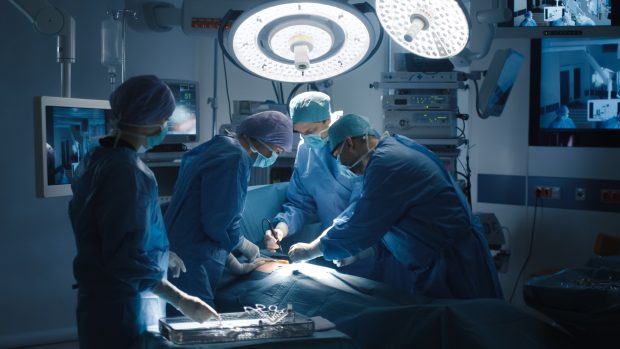
An urgent review of the use of unregulated medics to replace doctors is required across Scotland, experts say, as new figures show they have been involved in serious medical mishaps in Scottish hospitals.
Last week the BMA called for an immediate halt to the recruitment of physician associates (PAs) and anaesthetic associates (AAs) amid concerns about patient safety.
PAs qualify after two-year university courses then see patients, diagnose illnesses and act as doctors’ assistants, but senior doctors and medical bodies have voiced serious concerns about their lack of training and regulation.
Now The Sunday Post has learned PAs have been involved in “never events” or “serious adverse events” in two Scottish health authority areas.
Never events are preventable incidents that have the potential to cause severe harm or death, while serious adverse events are any untoward medical occurrence that at any dose results in death, admission to hospital or prolongation of existing hospitalisation, persistent or significant disability/incapacity or a congenital anomaly or birth defect.
NHS Lanarkshire said it had seven “never events” involving treatment given by PAs between May 2020 and September 2023, while NHS Lothian said it had “five or fewer” “serious adverse events” involving PAs over the past five years.
Last night senior surgeon Dr Zubir Ahmed, an NHS consultant who works in a large teaching hospital and is a prospective Labour candidate for the Glasgow South West constituency, called for an urgent review of PAs.
He said: “The involvement of physician assistants – who have now morphed in to associates without consultation – in multiple never events, requires an urgent focused national review. This is further evidence that the BMA is right to call for a pause in PA recruitment until regulatory frameworks and checks and balances for their use are put in place.”
Meanwhile, a Scottish GP, who The Post is not naming, said: “It is essential that patients know who they are consulting with. The clinician must be appropriately educated and experienced, especially when seeing undifferentiated cases – ie first presentation where no previous diagnosis exists – such as in GP and emergency medicine.
“Those who patients see for diagnosis must be registered professionals who are regulated. Registration and regulation allows clinicians to be held to account.”
Leading doctors say that neither patients nor doctors have been properly consulted about what PAs can do, or the scope of their training.
Earlier this year an inquest in London heard how a 30-year-old woman died after going to her GP practice to complain of calf pains and shortage of breath. Emily Chesterton was seen by a physician associate and not a doctor. Her calf pain was misdiagnosed as a sprain, and her shortness of breath was mistaken for Long Covid and anxiety. She died after developing a pulmonary embolism.
Meanwhile, Colleen Howe was reassured by a PA that a lump in her breast was a blocked milk duct. It was cancer, and the delayed diagnosis left her with “fewer options”, her family said. She died in April.
More than 3,000 physician associates currently work in the UK, with 142 “whole time equivalent” posts in Scotland.
The GMC expects that number to grow, with 36 universities now running PA courses, including Aberdeen University.
Leading doctors say that neither patients nor doctors have been properly consulted about what PAs can do, or the scope of their training.
Professor Philip Banfield, BMA chair of council, said: “Doctors are worried about the relentless expansion of the medical associate professions, brought into sharp focus by terrible cases of patients suffering serious harm after getting the wrong care.”
The Royal College of Anaesthetists, at an extraordinary general meeting last month, passed a motion saying all patients should be informed, where applicable, that an AA could be involved in their care, and that they are not a registered medical practitioner.
Dr Sarah Clarke, president of the Royal College of Physicians, which provides professional support to PAs, said: “Physician associates play an important role in caring for patients as part of a multidisciplinary team, providing vital support to a workforce which faces significant demand. However, we also recognise the concerns raised by patients and the medical community, in particular regarding their regulation and scope of practice.
“The BMA’s call this week reflects these concerns. Like the BMA, we too are hugely disappointed at the slow pace of regulation for a profession that is now more than 20 years old in the UK. We need to work together, the NHS and medical community, to create a better understanding of the PA role and ensure appropriate supervision. Regulation which will reassure patients and ensure safe practice cannot wait.”
Dr John Keaney, NHS Lanarkshire acute medical director, said: “Learning from adverse events is key to improving the safety and quality of care and we actively encourage an open culture where incidents are reported when the highest standard of care has not been maintained.
“NHS Lanarkshire is committed to learning from adverse events, minimising the chance of recurrence and improving our services.
“We would like to reassure patients that adverse events are still extremely rare and they can be confident they will receive safe, high-quality treatment and care. There is no evidence that there are more adverse events involving physician associates/assistants than doctors.
“Physician associates/assistants have worked in Lanarkshire for over a decade and are valued members of a multi-professional workforce.”
Dr Tracey Gillies, medical director of NHS Lothian, said: “Our physician associates in Lothian work under the supervision of a named physician, as part of a multi-disciplinary team. They are valued members of our team and are medically trained healthcare professionals who work alongside doctors to perform a number of duties, including taking medical histories, performing examinations, diagnosing illnesses, analysing test results and developing management plans for patients.
“They provide high-quality, safe and effective clinical and emergency care using established clinical guidelines in conjunction with the clinical teams and in line with nationally agreed protocols and guidance.
“If any member of a clinical team was involved in an adverse event, we would ensure that proper process was followed and, if required, an investigation carried out. Recommendations would then be made to improve practices and urgently put in place to prevent a repeat of a similar incident.”
The Scottish Government said: “Physician associates are an important and valued part of the NHS Scotland workforce. As part of our National Workforce Strategy for Health and Social Care and our ongoing aim to ensure the workforce is fit for the future, the Scottish Government will continue to consider how these roles can be utilised to best effect, supervised and supported by senior medical professionals throughout their training and subsequent deployment.
“We are also working with the Department of Health and Social Care and a range of stakeholders to bring physician associates and anaesthesia associates into regulation by the General Medical Council. This will for the first time introduce consistent standards for education and behaviour and UK-wide professional accountability to these roles.”

Enjoy the convenience of having The Sunday Post delivered as a digital ePaper straight to your smartphone, tablet or computer.
Subscribe for only £5.49 a month and enjoy all the benefits of the printed paper as a digital replica.
Subscribe © SYSTEM
© SYSTEM